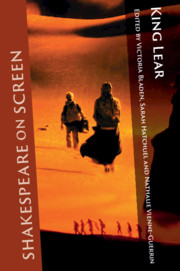Book contents
- Shakespeare on Screen: King Lear
- Series page
- Shakespeare on Screen: King Lear
- Copyright page
- Dedication
- Contents
- Illustrations
- Notes on Contributors
- Series Editors’ Preface
- Acknowledgements
- Chapter 1 Introduction: Dis-locating King Lear on Screen
- Part I Surviving Lear: Revisiting the Canon
- Part II Lear en Abyme: Metatheatre and the Screen
- Part III The Genres of Lear
- Chapter 7 Negotiating Authorship, Genre and Race in King of Texas (2002)
- Chapter 8 Romancing King Lear: Hobson’s Choice, Life Goes On and Beyond
- Chapter 9 ‘Easy Lear’: Harry and Tonto and the American Road Movie
- Part IV Lear on the Loose: Migrations and Appropriations of Lear
- Index
- References
Chapter 9 - ‘Easy Lear’: Harry and Tonto and the American Road Movie
from Part III - The Genres of Lear
Published online by Cambridge University Press: 10 September 2019
- Shakespeare on Screen: King Lear
- Series page
- Shakespeare on Screen: King Lear
- Copyright page
- Dedication
- Contents
- Illustrations
- Notes on Contributors
- Series Editors’ Preface
- Acknowledgements
- Chapter 1 Introduction: Dis-locating King Lear on Screen
- Part I Surviving Lear: Revisiting the Canon
- Part II Lear en Abyme: Metatheatre and the Screen
- Part III The Genres of Lear
- Chapter 7 Negotiating Authorship, Genre and Race in King of Texas (2002)
- Chapter 8 Romancing King Lear: Hobson’s Choice, Life Goes On and Beyond
- Chapter 9 ‘Easy Lear’: Harry and Tonto and the American Road Movie
- Part IV Lear on the Loose: Migrations and Appropriations of Lear
- Index
- References
Summary
Harry and Tonto (dir. Paul Mazursky, 1974) uses the American road movie, a signature genre of late 1960s and early 1970s film, to address the experience of an older man who, exiled from his home, travels through America, coming in contact with the nation’s counterculture and working-class culture, in the process reassessing himself and his place in American society. Though the film was critically lauded in its day, few Shakespeare film scholars afterwards have explored its many parallels with King Lear, even though passages from the play are explicit points of reference in multiple scenes and there are myriad echoes of Lear in characterization and narrative. This chapter examines how and why writer-director Paul Mazursky brought Shakespeare’s King Lear and the American road movie of the early 1970s into productive dialogue with one another. Lear provides a means for broadening the range of the road movie beyond youth culture, allowing for re-examination of relations between generations and suggesting the congruence between Lear’s ‘unaccommodated man’ and those outside the American cultural mainstream. At the same time, the road movie provides King Lear a means to be accommodated to a specifically American sensibility.
- Type
- Chapter
- Information
- Shakespeare on Screen: King Lear , pp. 140 - 154Publisher: Cambridge University PressPrint publication year: 2019



